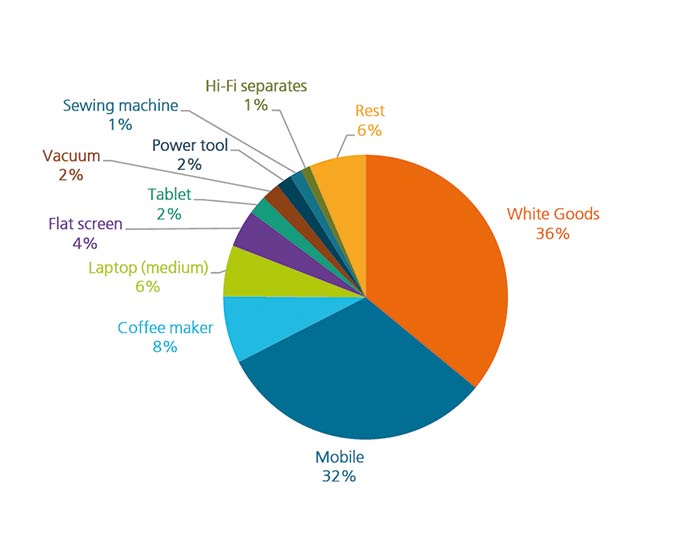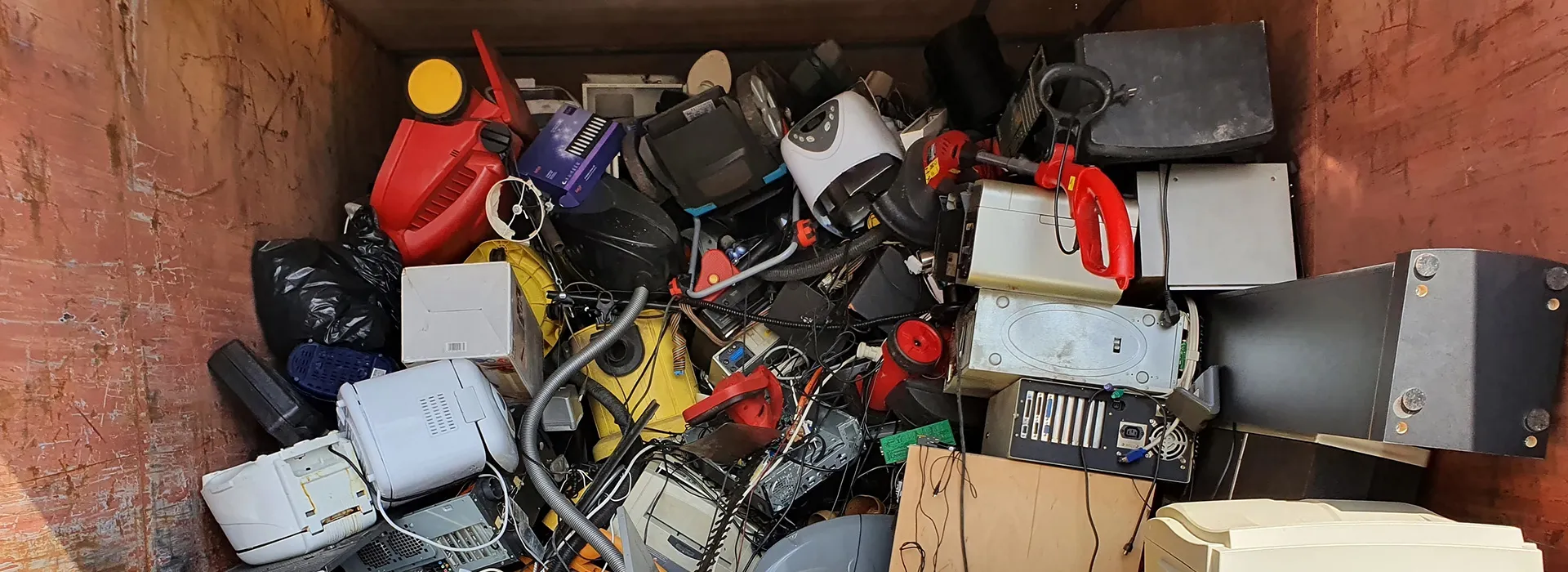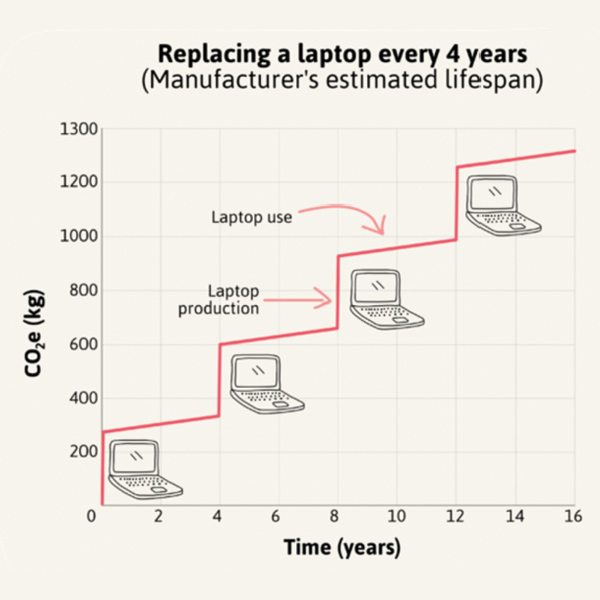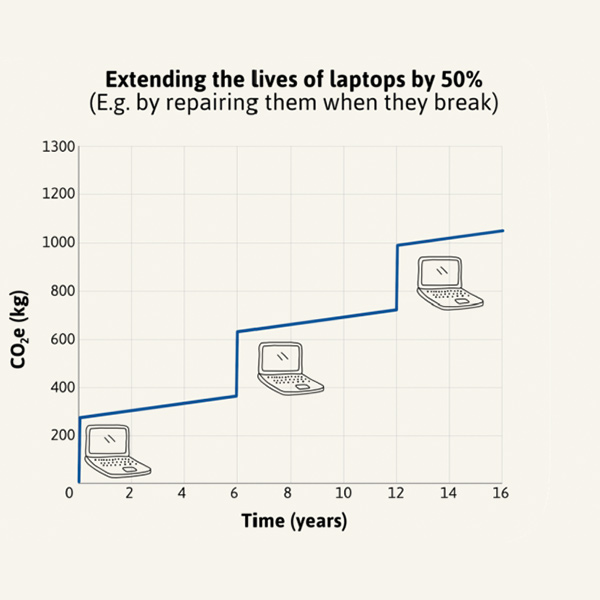Thousands of pieces of consumer electronics are thrown out every year. Electronic waste is one of the fastest growing waste streams. However, many electronic devices that are disposed of in this way have not yet reached the end of their actual service lives. The repair bonus is intended to remedy this. It serves as a financial incentive to motivate consumers to have defective electrical appliances repaired.
The repair bonus already exists in the German States of Thuringia and Saxony. On behalf of the Thuringian Ministry for the Environment, Energy, and Nature Conservation (TMUEN) and the Thuringian Consumer Protection Center (VZTH), Fraunhofer IZM conducted a study for an »Extended ecological impact assessment of the Thuringian repair bonus«.
Erik Poppe, research associate in the Environmental & Reliability Engineering department, was able to prove that the repair bonus leads to less carbon emissions and minimized electronic waste. It promotes appreciation for professional repair services and brings the topic of sustainable recycling management more into the wider public’s awareness.
The repair bonus is set to be introduced in Berlin on September 1, 2024. Following Thuringia and Saxony, Berlin is the third federal state to create a financial incentive for consumers to have their electrical appliances repaired rather than throwing them out when they are faulty or damaged.
Fraunhofer IZM has now been able to prove that the concept works in an impact assessment using Thuringia’s repair bonus scheme as an example. The aim of this study was to investigate the ecological and economic effects of the repair bonus and its impact on consumer behavior.
»The results are promising,« Erik Poppe, research associate at Fraunhofer IZM, confirms. »From 2021 to 2023, 33,288 repairs were carried out in Thuringia, resulting in the saving of 2,971 tons of CO2-eq and 390 tons of electronic waste. This is roughly equivalent to the annual emissions of 275 typical German households.«
If the service life of electronic devices is extended through repairs, CO2 emissions increase significantly more slowly. | © Restart Project 2023
Why repairing »white goods« is so important
In Thuringia, the repair bonus is primarily used for »white goods« – major household appliances like washing machines, refrigerators, or dishwashers. This product group accounted for 36% of repair commissions. White goods are one of the 17 product groups that accounted for 99% of the CO2 avoidance potential identified in the study, with TVs and flat screen displays in second place at 14%, and smartphones in third place at 8.2%.

Relative distribution of all repairs between 2021 – 2023 © Fraunhofer IZM (Repair bonus Thuringia (N=30288))
For white goods and large household appliances, an average of 177 kg in carbon emissions is generally thought to be avoided with every repair. With the high number of repairs, 1936 t CO2-eq. could be saved in the white goods group alone (which accounts for approx. 65% of the potential CO2 avoidance). TVs and flat screen display accounted for 413 t in CO2 savings, while smartphones, which were the second most frequently repaired category after white goods at 32%, only accounted for 244 t in CO2 savings.
»The repair bonus is particularly effective for large household appliances,« Erik Poppe explains. »Making products in this category is material and resource-intensive, which is why it is all the more important to get their service life extended. For these appliances in particular, repairs – and therefore the repair bonus – are worthwhile in environmental terms.«
Through representative surveys, the researchers were able to determine that a large proportion of the population (approx. 67%) would welcome and potentially use a Germany-wide repair bonus. However, the application process must be as straightforward and as easy to access as possible. Erik Poppe agrees:
»With the repair bonus, the public sector has a new instrument at its disposal to promote repairs within the framework of R2R in a low-threshold and broadly effective manner. There is a great deal of interest, and the results so far are impressive. But there is one point that I personally think is good, apart from all the calculations and research: In contrast to some other environmental bonuses (car, solar, house), everyone benefits, because sooner or later everyone will have a faulty electrical appliance in their home and the repair bonus can give them a nudge in the right direction.«
Positive effects for the environment and economy
The Thuringian repair bonus shows great potential, particularly when it comes to repairing white goods, as it is highly likely that a new purchase – and therefore further use of resources – can be prevented through repairs. The same applies to other large household appliances such as TVs and flat screen displays. Smartphones, on the other hand, do not contribute much to the positive environmental effects, even if they were the second most frequently repaired items.
However, the data collected also points to weaknesses. »The inadequate data situation makes a complete life cycle assessment of the repair bonus in all of its areas impossible,« Erik Poppe admits. »Nevertheless, the data collected in Thuringia is extremely important with regard to the right to repair. For the first time, market data on current repair costs was collected on a large scale. This will become more of a focus, especially in the further development of the directive.«
The data obtained also provides new, important insights for the standardization and design of new EU ecodesign directives. The study and its results and methodology can serve as a basis for further research and help establish standardized processes for assessing the environmental impact of the consumption of electrical appliances.
Introduction of the repair bonus in Berlin – an outlook
The results are also promising for the planned introduction of the repair bonus in Berlin.
Berliners have been able to apply for the repair bonus online since September 17, 2024. The application period runs from 17.09.2024 to 31.12.2024.
Funding is available for repairs by a specialist company (50% of the repair costs of which the invoice amount must be at least €75; max. €200 in total per person) OR the purchase of spare parts and repair in a repair café or a repair initiative (100% of the spare parts costs; max. €200 in total per person).
Funding is available for the repair of standard household electrical and electronic appliances.¹
Erik Poppe and his team see four aspects as particularly central for the design of future repair bonuses:
- Flexible application processes
Consumers prefer a simple, low-threshold application process, ideally online from home or directly on site at the repair business. - Defined funding volume
The bonus is currently only provided for as long as funding is available. With a larger total volume, more funding could be provided over a longer period, which is why one aim should be to introduce objective criteria for determining the funding volume. - Flexible funding amounts per product category
The Thuringian repair bonus shows that certain product categories in particular are repaired more often than others (and that their environmental impact differs significantly). Different funding should therefore be developed for different product categories, with greater priority on funding products whose environmental impact is higher. - Introduction of a long-term, Germany-wide repair bonus
A Germany-wide, long-term subsidized repair bonus would not only have ecological added >value but would also meet the demands of the Consumer Protection Ministers’ Conference and the recommendations of the EU commissions.²
Repair bonuses are financial incentives designed to encourage consumers to get defective or damaged items repaired, instead of throwing them away or replacing them with new ones. Repair bonuses can be paid out in the form of direct subsidies, discounts, or vouchers and are usually politically driven by individual countries.
Repair bonus schemes exist in Austria, France and elsewhere. In 2021, they were also introduced in Germany, where the project was commissioned by the Thuringian Ministry for the Environment, Energy and Nature Conservation (TMUEN) and the Thuringian Consumer Protection Center (VZTH). A repair bonus scheme also came into force in Saxony in 2023 and another scheme is being prepared for Berlin in 2024.
All information as of September 20, 2024 without guarantee. Subject to changes and errors.
² Source:
VSMK: Ergebnisprotokoll der 19. Sitzung der Verbraucherschutzministerkonferenz am 30. Juni 2023 in Konstanz, S. 34-35: https://www.verbraucherschutzministerkonferenz.de/documents/ergebnisprotokoll-19-vsmk_oeffentlich_18-07-2023_1689678836.pdf
Europäisches Parlament, 23.04.2024: Recht auf Reparatur: Reparieren einfacher und attraktiver machen: https://www.europarl.europa.eu/news/de/press-room/20240419IPR20590/recht-auf-reparatur-reparieren-einfacher-und-attraktiver-machen
The repair bonus in Thuringia is currently in its fifth funding phase.
Decisions on the extension of the program in Thuringia and Berlin for the 2026/27 fiscal year are still pending.*
*As of September 23, 2025







Add comment